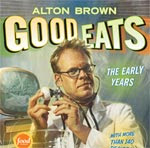I was watching "Guilty Witness" on “Alfred Hitchcock Presents” a week or two back and to my delight one of the characters was served a plate of scrapple, one of my all-time favorite foods (my mom’s homemade cheese blintzes and my wife’s home-made split pea soup are right up there at the top of the list too). It reminded me that I needed to fulfill a promise to foodie blogger extraordinaire Jessica Porter, to explain my rather elegant title of “The Scrapple King” to this blog’s readers.
I know that the countless readers of this excellent blog wonder why I chose that moniker rather than, say the “Meister of Meatloaf” or "Baron of Bacon" (both of which, by the way, I wouldn’t mind owning as well). I chose “The Scrapple King” because it best describes my love for this wonderfully unique Pennsylvania Dutch meat product. It is a royal designation that admittedly I have bestowed upon myself, although my paternal grandmother was descended from the original Pennsylvania Dutch settlers who made a new life in Southeastern Pennsylvania
A couple of years back I had the joy of sharing my love for scrapple with the readers
If there is a true royal name in the world of scrapple it is Habbersett. This Pennsylvania-based company makes the best scrapple in the civilized world. I was born in
 Farm out of
Farm out of "What is scrapple?"you may be asking. Well, don’t ask. Be content in knowing that scrapple is a pork-based product that efficiently leaves no parts of pork wasted. Just as the early colonial settlers were conscious of making every penny stretch, we should, in these challenging economic times, also be conscious of making our food budget stretch as well. Scrapple is an affordable and tasty way to feed family and friends without making much of a dent in your wallet. Be satisfied in knowing that scrapple is a wonderful mixture of meat and spices that make it an excellent breakfast meat, although I could eat it at any time of the day or night (and have been known to do so).
Scrapple is a very easy product to make. It comes in one pound bricks that take but a few minutes to prepare and eat. The brick should be sliced while it is cool but not too cold. With a sharp kitchen knife the brick should be sliced into thin pieces roughly ½ inches thick. Too thin and the slice will probably break apart. Too thick and you will find it difficult to adequately ensure that the center of the slice will be properly heated without burning the outside. Once cut, coat the slices with plain white flour and place on a preheated frying pan at medium temperatures. Non-stick pans do not need any prior treatment but skillets or other non-treated pans would benefit from a light coating of PAM cooking spray or shortening (this to keep the slices from sticking when flipped.)
Scrapple should be fried for several minutes on each side. The best way to know when to flip the slice over is when the flour coating the top of the slice appears melted or translucent. A quick flip is required because scrapple has been known to break-up if the flip is done too slowly. An equal amount of heating on the second side and the scrapple is ready to be served. I prefer it dipped in ketchup, my mom and wife prefer it with a side home-made Pennsylvania Dutch chili sauce, once lovingly prepared by my late-grandfather, now fashioned by my Uncle Joe (perhaps if I get enough requests for his recipe, Uncle Joe will share it with me and I with you). Some prefer it plain. No matter how you eat it the key is to savor each delicious, spicy bite. Before you know it the one pound brick will be gone and you’ll be rushing back to the store for more. To avoid this scenario purchase several bricks at once. Trust me, all you scrapple-newbies, your life will be forever changed once you have savored your first bite of Habbersett’s well-earned slogan: “

1 comment:
I think for the gentle readers of this blog, you need to attempt to make scrapple from scratch one time and document the experience.
Post a Comment